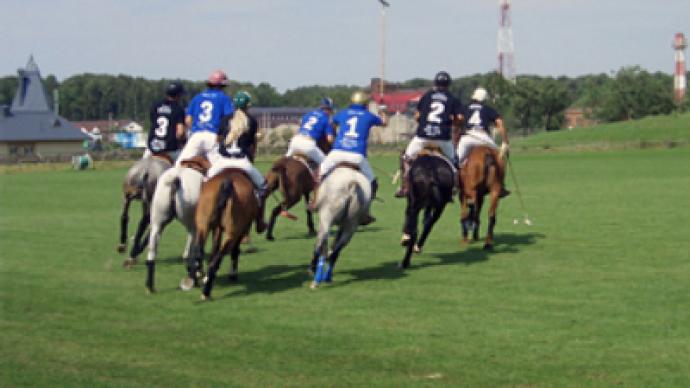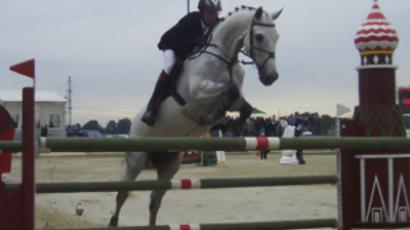Polo survives in Russia despite crisis

The rich and famous have once again gathered at the annual polo cup, organized by the Russian Polo Club, proving that financial crisis won't put an end their favorite sport.
Polo is a team sport played on horseback, in which the players have to score against their opponents' by delivering a wooden ball into their goals using a long-handled mallet.
It's known as an amusement for the rich, so it couldn't have avoided the impact of the world financial crisis. The usual Winter Cup didn't take place at all, and the summer tournament was organized, although without glamour and luxury it once had.
Guests, who used to eat caviar with spoons in previous years, this time were offered fruits and delicious, but simple, snacks.
Opera stars and bands of dancing Cossacks are unaffordable for the organizers anymore, so they were forced to make the game of polo itself the main feature of the event, placing the tents for audience just meters away from the battle field.
The cup was sponsored by an elite vodka brand and the amount of Russian national drink was unlimited at Otrada Equestrian Center on the day. Some enjoyed it straight, but most preferred cocktails of red, green and yellow colors – a kind of a Russian traffic lights in which all the colors mean "Go!" But despite the summer heat, no one got too carried away.
The legend of Russian television, Vladimir Pereturin, was invited to commentate on the games live. During his thirty years on the screen, he has worked at several Olympic Games, World and European championships and hosted the long running show ‘Football Review'.
The veteran wasted no time in understanding the polo rules, but never missed a chance to find parallels with his favorite game of football.
"There's a term ‘pony goal’ in polo, when a goal is occasionally scored by a horse. Well, I saw my first pony goal back in 1960 at the first European Football Championships, where the Russians beat Yugoslavia in the final. Viktor Ponedelnik scored the winner for us and his nickname within the team was Pony," Vladimir Pereturin laughed.
The commentator praised the good organization of the event and especially highlighted the battlefield saying, "Any football club would love to have such quality grass at their arena".
Spanish language was mainly heard on the pitch as Argentina remains the leading nation in polo. Most of the 50 polo players in Russia are expatriates from Argentina, Peru, Britain and the US, with locals just learning the basics of the game. But some of them, like the President of Moscow Polo Club Alexis Rodzianko, his son Misha and daughter Tasia, are already showing great form; sometimes even able to challenge the professionals.
The polo ponies – small, but fearless and well-behaved horses – are also imported from South America. The price of an average pony starts from $15.000 and each player needs three or four of them during a game.
Three teams battled for the cup and they all played each other twice on Saturday and Sunday. Each squad of four had two professionals in it, and according to the lineup, it was the game of the highest level ever to take place in Russia. In the end, the players representing the main sponsor came out on top.
And the man behind the resurrection of polo in Russia, Viktor Huaco, was among the winners.
However, he didn't have to start from scratch in his quest for re-establishing the game, as it appears to have enjoyed quite a long history in the country.
"It was popular in Russia before the revolution of 1917. Aristocrats and Tsar's family enjoyed this beautiful and dynamic game. The first competition of polo in Russia was held on June 10, 1884 near St Petersburg during the reign of Alexander II," polo expert Yulia Serkova said.
The elite sport was forbidden in Soviet times, and made its return only in the 2000s.
"Victor Huaco played polo in his home country of Peru and in the US. But after his business moved to Moscow, he did everything to bring the game to a new place. He organized the Russian Polo Club, which held its first tournament in 2003. It set the benchmark for a new era in the history of polo in the country," Yulia Serkova added.
And Victor Huaco believes that despite the financial turmoil, polo in Russia will continue its development.
"I want to thank everybody, who came to play and to watch today. And I am looking forward to seeing all of them at our next tournament," he said.
The Russian Polo Club is already inviting guests for the event next summer.
Dmitry Gorshkov, RT













